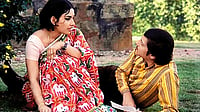I sometimes wonder why cyclones often have bizarre names. Fani immediately reminds one of a serpent and its deathly fangs. Amphan, pronounced ‘um-pun’, means sky in Thai. As actors, we accept or reject movies on the strength of a script. But why an apparently innocuous name like Amphan—a name that Thailand proposed in 2004—decided to strike a rather laidback and benign city like Calcutta confounds me. Mother Nature probably wanted to test the City of Joy’s limit of perseverance.
The sheer destruction that Amphan has left in its wake is there for all of us to see, but the emotional distress it has caused is unimaginable. The city has lost over 5,000 trees—that’s almost an entire generation gone. It is bound to upset an already tottering ecosystem. Trees are the hallmark of some of Calcutta’s streets. The Southern Avenue, for example, is probably the leafiest road in south Calcutta. It abuts the Dhakuria Lake and the two world-class golf courses—Royal and Tolly—where Calcutta’s lungs reside.
Heart-breaking stories of tragedy abound. Two young men electrocuted by an unseen live wire, the asphalt sheet swept off a village street, a tree slicing a minibus into half on the Golf Green-Howrah route…these vignettes are simply horrifying. When I hear that my manager Sharmistha has been without electricity for five days and paid Rs 180 for two candles, I am aghast. When I hear that my maids, who hail from South 24 Parganas, have lost their huts and their humble belongings have been washed away, my mind goes numb. We are trained to act. We laugh, we cry, we go ecstatic and we can sink to the depths of despair on screen. But I am now caught in a belligerent crossfire of emotions. This script is for real, you don’t need to act. Mother Nature is the ultimate producer and director.
As an actress, there is no clear definition of ‘family’ for me. My husband, my children, my mother, my mother-in-law, my in-laws…is that all? Not quite. From the spot boy to the technician to the make-up artist, the directors and producers, my co-actors and of course my thousands of fans, they are all family. My extended family is like an ocean and my heart goes out to each one who has suffered from the fury of the cyclone. In our lifetime, Amphan has been the worst natural calamity we have seen. Calcutta was certainly not prepared for it. And coming as it did at a time when millions are suffering from a deadly virus, Calcutta’s back was broken. My profession has taken me across the world but there is nothing like Calcutta. There is life in every leaf, every brick and every whiff of air you inhale. That’s why Calcutta is the City of Joy. I am devastated because the city’s heritage spots have been ruined.
I had recently shot at College Street in North Calcutta for Agnidev Chatterjee’s Jihad with Rohit Roy. We went to the famous Coffee House and used hand-pulled rickshaws in a few scenes. I reckon College Street is the world’s biggest repository of old books. Every shop is unique. It’s a bibliophile’s paradise. To see books floating in dirty water is tragic. Not far from College Street and across the serpentine Central Avenue is Kumartuli. We were shooting here for Sujit Mondal’s Anweshan with Ronojoy Bishnu. It’s the place where artisans mould the clay from the river Hooghly into shapes of the gods we worship round the year. Amphan did not spare many sheds under which the idols of Durga and Kali are made. That leaves me with a question—why did Mother Nature attack artisans who create gods with their own hands?
Calcutta may not keep pace with the glitz and glamour of New York or Singapore, but it’s probably the only city in the world that has learnt to live with its heritage and old charm intact. College Street and Kumartuli are fine examples. I really don’t know if these book shops will ever recover. The clay artists probably will.























